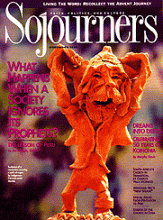Thirty years ago, Bob Dylan's first record came out. Dylan drew on influences that far preceded his young 20 years. He picked up the talkin' blues and gospel from the South and hillbilly music from Appalachia, all the while reinterpreting and recreating the songs as only he could.
Since that epochal moment three decades ago, the idiom popularized as "folk music" has gone through several transformations. But through it all, it still remains true to its roots as its practitioners weave influences carried down through the generations.
One has only to think of artists such as Suzanne Vega or Nanci Griffith to hear early Joan Baez. The protest songs of Billy Bragg echo the indignation of Pete Seeger. And a group popular a few years ago, the Washington Squares, were dead ringers for Peter, Paul, and Mary.
These contemporary sounds have been categorized as "urban folk," or as one disc jockey called it, "the new weave." While the phrase refers to the seminal folk group The Weavers, it also reflects the variety of styles and influences woven throughout the music of today's singer/songwriters.
Windham Hill, a record label well known for its ambient sounds, is carrying the torch of folk music with its vocal label, High Street Records. With a roster of artists who are primarily singer/songwriters, founder Will Ackerman is giving exposure to artists who might normally be relegated to smaller, more obscure record labels.
In the past few years, High Street has featured three artists who have garnered critical acclaim for both their recorded work and their live performances. John Gorka, Patty Larkin, and Pierce Pettis share more in common than just recording for the same record company. They all write from an intensely personal perspective. Each of their records is a document of everyday lifeits successes and failures, its joy and despair - in other words, the essence of folk music.
Read the Full Article

